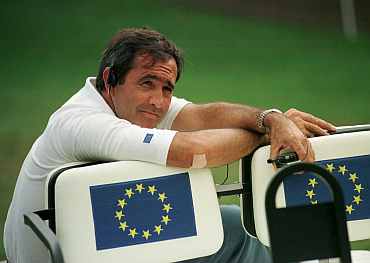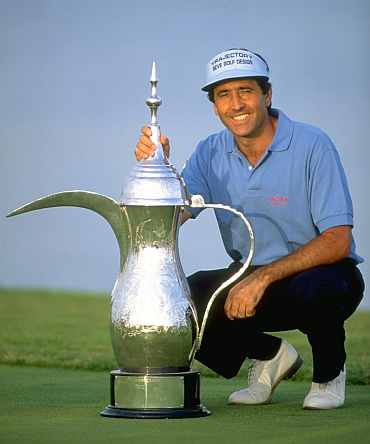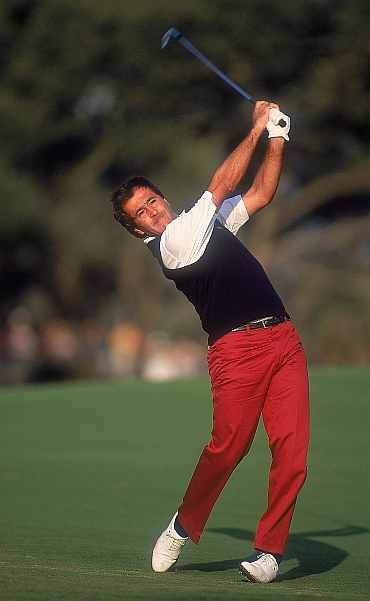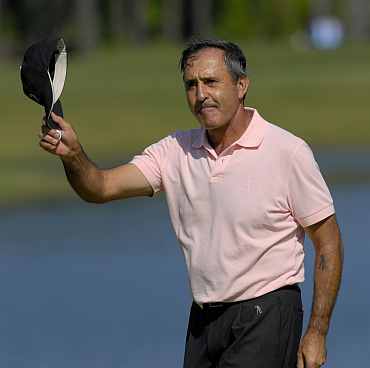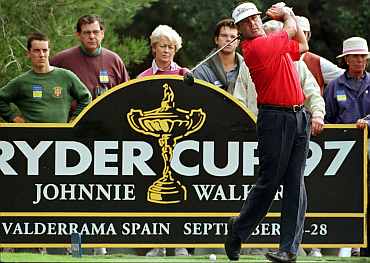 | « Back to article | Print this article |
One of the most gifted and charismatic players
Five-times major winner Seve Ballesteros, regarded by many as golf's greatest shot-maker, was one of the most gifted and charismatic players to have graced the game.
The Spaniard, who died at his home in northern Spain on Saturday at the age of 54, thrilled fans across the globe with his swashbuckling style, magical touch around the green, creativity and passion for the sport.
After revealing in October 2008 that he had a brain tumour, Ballesteros had four operations before undergoing a course of chemotherapy.
He appeared in public again for the first time in mid-2009 to a standing ovation and only last October seemed in high spirits and was cracking jokes at a symposium on brain tumours supported by his foundation.
Ballesteros piled up 87 titles worldwide
His family announced on Friday that his neurological condition had deteriorated severely.
"Today, at 2.10 a.m. Spanish time (0010 GMT), Seve Ballesteros passed away peacefully surrounded by his family at his home in Pedrena," they said in a statement on the player's personal website.
The final cause of death was respiratory problems, the statement added.
Ballesteros piled up 87 titles worldwide, 50 of them on the European Tour, and his sublime golf skills were more than a match for his erratic driving while in his pomp.
A winner of three British Opens and two Masters titles, he gave the European game a much-needed lift in the late 1970s. Along with Briton Tony Jacklin, he was chiefly responsible for reviving Europe's fortunes in the Ryder Cup team competition.
Car park champion
Ballesteros became a father figure for Spanish golf and replaced American Arnold Palmer as the game's most flamboyant and charismatic figure.
From the age of seven, he was using a cut-down three-iron on the beach near his home in Santander and this helped him master the art of the manufactured shot from just off the green which lasted throughout his career.
Ballesteros arrived on the international scene, virtually unheralded, at the 1976 British Open as a 19-year-old of raw talent with an extraordinary swing, which seemed to turn 360 degrees.
That exuberant swing frequently came close to knocking him off his feet with its momentum long after his golf ball was sent soaring into the distance.
In 1979, the gifted Spaniard won the first of his British Open titles at Royal Lytham after conjuring magical rescue shots from all parts of the course. One such recovery earned him the epithet of: "Car Park Champion".
American Ben Crenshaw, a double Masters winner and keen student of the game, said of Ballesteros: "Seve plays shots I don't even see in my dreams."
Tortuous slide
In 1980, Ballesteros won his first green jacket at Augusta National, becoming the first European to clinch victory at the Masters since it was first held in 1934.
Another followed three years later and in 1984 he again lifted the prized British Open claret jug at the home of golf, St Andrews.
In 1988, he claimed his fifth major title in the British Open at Royal Lytham. At the age of 31, he was apparently only just entering his prime as a golfer.
Unexpectedly, that was to be his last major success. His slide during the following decade from the pinnacle of the game, despite a brief resurgence in the early 1990s, was tortuous and very public despite a series of coach and caddie changes.
He led Europe to a rousing Ryder Cup victory
He still drove the ball prodigious distances but all too often into trouble well off the fairway from where even he could not salvage par.
His 50th and final European Tour title came, rather appropriately, at the 1995 Spanish Open.
Two years later, though, he was able to celebrate one of the crowning achievements of his career. At Valderrama in Spain, he led Europe to a rousing Ryder Cup victory over the U.S. by 14-1/2 points to 13-1/2.
He made a natural choice as non-playing European captain on his home soil and was inspiration personified as he charged across the course in a golf cart urging on his troops.
Six years ago, Ballesteros reflected on his glory days as a player:"I have had a wonderful career and I have a wonderful life. The Ballesteros era is over but I was the Tiger of my day."

© Copyright 2025 Reuters Limited. All rights reserved. Republication or redistribution of Reuters content, including by framing or similar means, is expressly prohibited without the prior written consent of Reuters. Reuters shall not be liable for any errors or delays in the content, or for any actions taken in reliance thereon.
